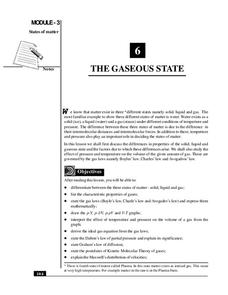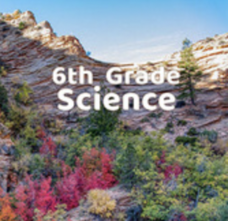K12 Reader
Solids, Liquids, & Gases
Solids, liquid, and gas, the three states of matter, are the subject of a cross-curricular reading comprehension exercise that asks kids to first read an article about these forms, and then to respond to a series of questions based on...
Center for Learning in Action
Introducing Physical and Chemical Changes
Young scientists investigate chemical and physical changes to the states of matter—gas, liquid, and solid—as well as solutions and suspensions with a variety of demonstrations, grand conversation, and an interactive quiz to check for...
Nevada Outdoor School
Let It Snow! Let It Melt!
Winter weather offers a great opportunity to teach young scientists about the states of matter. This activity-based lesson includes a range of learning experiences, from experimenting with the rate at which ice melts to singing a song...
Biology Junction
Chemistry
You matter—unless you multiply yourself by the speed of light squared, then you energy! Scholars learn about matter, energy, the elements and so much more using an informative presentation. Completing the included worksheet creates a...
Urbana School District
Fluids
In 1879, Sir William Crookes discovered the fourth state of matter, plasma. The presentation covers states of matter, phase changes, density, pressure Pascal's Principle, buoyant force, Archimedes' Principle, Bernoulli's Principle,...
Franklin D. Roosevelt Presidential Library & Museum
Pearl Harbor Activity #2: Why Do Words Matter?
Words matter! That's the big idea behind an activity that asks scholars to replace words in FDR's "Day of Infamy" speech with synonyms. They then listen to a recording of President Roosevelt's address and compare his version to their own.
Franklin D. Roosevelt Presidential Library & Museum
Pearl Harbor Activity #5: The Medium Matters
Young journalists learn that how we get our news and information matters in a collaborative social studies activity. The class is divided into three groups with the first analyzing a transcript of FDR's "Day of Infamy" speech, the second...
American Chemical Society
Molecules Matter
Did you know that jumping spiders sometimes wear water droplets as hats? A seventh grade science lesson plan introduces the concept of what makes up water: tiny molecules that are attracted to each other. Starting with a chemistry...
Teach Engineering
Antimatter Matters
Use science fiction movies to teach pupils about antimatter and alternate universes. Individuals learn about the portrayal of antimatter and alternate universes in movies such as Star Trek and Angels & Demons. They consider three...
Scholastic
Study Jams! Energy & Matter
After Sam knocks a glass off the lunchroom table, he uses it as a springboard for explaining kinetic and potential energy. He mentions that sound is a type of kinetic energy and introduces the different forms of energy: thermal,...
Columbus City Schools
ABC: Acid Base Chemistry
Bubble, bubble, boil and trouble! What causes common substances like baking soda and vinegar to react the way they do? Welcome your junior chemists to the wonders of acid-base chemistry using a comprehensive and fun resource. Engage them...
Paul Hamlyn Foundation
Work That Matters: The Teacher’s Guide to Project-Based Learning
Whether new to inquiry-based learning or experienced with its protocols, you'll find much to value in High Tech High's comprehensive guide to project-based learning. Designed for educators, the guide has everything instructors need to...
Center for Learning in Action
Properties of Balls
Enhance your states of matter lessons with a hands-on science investigation that compares six different balls' color, texture, size, weight, ability to bounce, and buoyancy.
Albert Shanker Institute
Heart of the Matter
Most people have heard of Dr. Martin Luther King, Jr. and his famous "I Have a Dream" speech, but few have heard of Philip Randolph and Bayard Rustin. Who were these guys and what did they have to do with this famous landmark event in...
National Institute of Open Schooling
The Gaseous State
Sixth in a series of 36, this lesson focuses on gases and their behavior in given situations. Learners review the states of matter and then focus on gases, specifically learning Boyle's, Charles's, Avogadro's Laws, Dalton's, and Graham's...
Crabtree Publishing
Why Does Media Literacy Matter?
Criticism of news and entertainment journalism is at an all-time high. Help 21st-century learners develop the media literacy skills they need to become critical consumers with a three-lesson guide the looks at persuasive techniques used...
Science 4 Inquiry
All the Small Things
Scholars use sorting cards to try to define a pure substance versus a mixture. Risk becomes reward as they observe the differences and create a flowchart sorting matter into mixtures and pure substances (elements and compounds).
College Board
Why Variances Add - And Why It Matters
Why is adding variance important? A lesson outline defines a variance theorem and how it affects the data statistics. The instruction shows scholars the importance of considering the variance of data and why it requires independence.
Resources for Educators
Math & Science Connection
Whether you're using a collection of Dr. Seuss books to teach basic math skills like counting, adding, and subtracting, or exploring the different states of matter by melting a crayon with a hairdryer, a series of 11 fun activities...
Center for Learning in Action
Water – Changing States (Part 2)
Here is part two of a two-part lesson in which scholars investigate the changing states of water—liquid, solid, and gas—and how energy from heat changes its molecules. With grand conversation, two demonstrations, and one hands-on...
Utah Education Network (UEN)
Utah Open Textbook: 6th Grade Science
There are many interactions among living things and their surroundings. By completing a reading, scholars learn about the Earth, the moon, and the sun and how they relate to the solar system. They also investigate the basics of physical...
Facing History and Ourselves
When Differences Matter
Jane Elliott's controversial blue eyes/brown eyes experiment detailed in the film A Class Divided leads to a discussion of privilege, social power, and opportunity. Viewers note how the children react to the experiment, share their...
Just Health Action
Environmental Justice Matters: Mapping Environmental Justice Impacts (Part 1)
A case study of Seattle, Washington permits class members to compare and rank how different areas of Seattle are impacted by environment burdens. Groups investigate different zip codes, collect data on five categories, and color-code a...
Teaching Tolerance
Why Local Elections Matter
Uncle Sam wants everyone to vote in local elections! Geared toward middle and high school scholars, the resource explores voter turnout and the importance of local elections. Academics participate in group discussion, complete...
Other popular searches
- States of Matter
- Properties of Matter
- Physical Science Matter
- Phases of Matter
- Conservation of Matter
- Classification of Matter
- Science Matter
- Matter and Atoms
- Physical Properties of Matter
- Composition of Matter
- Cycles of Matter
- Changes in Matter

























